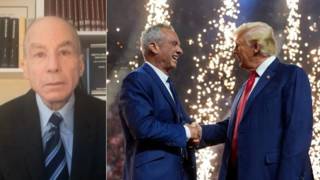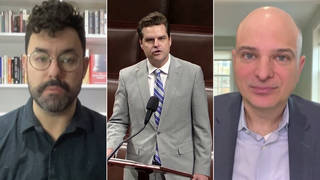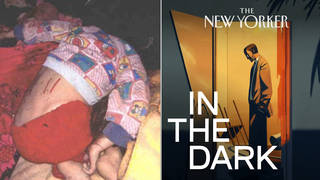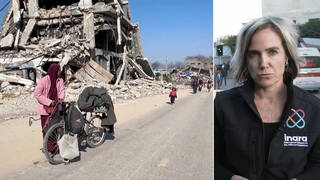
Related
Topics
In her most extended interview to date in the U.S., Italian journalist Giuliana Sgrena blasts a Pentagon report that clears the U.S. soldiers who opened fire on her car, wounding her and killing one of Italy’s highest ranking intelligence officials. Sgrena says, “It is important that the Americans press their government to tell the truth. Because it is in the interest of Americans, the truth. Not only of Italians.” [includes rush transcript]
We begin today with the ongoing controversy over the killing of one of Italy’s highest-ranking intelligence officials by US soldiers last month in Baghdad. On Monday, a US Army official reported that a military investigation has cleared the soldiers who shot dead Nicola Calipari on March 4 after US troops opened fire on the car that was also carrying Giuliana Sgrena–the Italian journalist who had just been freed from captivity. Sgrena has publicly rejected the U.S. claims that the shooting was justified. The leaking of that report sparked outrage in Italy.
The Italian officials on the US-led commission are reportedly refusing to endorse the U.S. Army’s findings. Italy maintains that that car carrying Calipari and Sgrena had been driving slowly, received no warning and that Italy had advised U.S. authorities of their mission to evacuate Sgrena from Iraq.
Yesterday, Giuliana Sgrena blasted the results of the investigation at a press conference in Rome.
- Giuliana Sgrena, Rome, Italy, April 26, 2005.
The U.S government has said it will not comment on the report until it is officially released. Here is Secretary of Defense Donald Rumsfeld and Chair of the Joint Chiefs of Staff, Richard Myers speaking at a press conference at the Pentagon yesterday.
- Pentagon news conference, April 26, 2005.
Italian judges are conducting a separate investigation into the killing. The report comes at bad time for Italian Prime Minister Silvio Berlusconi who was forced to resign last week in the wake of his center-right coalition’s defeat in recent regional elections. The defeat was blamed in a large part on Berlusconi’s unpopular decision to send troops to Iraq. He quickly put together a new Cabinet, hoping to cling to power through elections due next spring.
Yesterday I spoke with Giuliana Segrena by telephone from Rome where she is recovering from the injuries she suffered as a result of the shooting.
- Giuliana Sgrena, she joins us on the line from Rome, Italy.
Transcript
AMY GOODMAN: Yesterday, Giuliana Sgrena blasted the results of the investigation at a news conference in Rome.
GIULIANA SGRENA: [translated] Sgrena says, “I didn’t have great confidence in this inquiry given the past experiences of similar incidents and inquiries. Obviously, if what leaked today as the result of the inquiry, then it’s even worse than what I had anticipated, because earlier the Americans have spoken about a tragic mistake and they had somehow taken on some responsibilities. Now they seem unwilling to accept responsibility,” she says.
AMY GOODMAN: That was Giuliana Sgrena. The U.S. government has said it will not comment on the report until it is officially released. This is Secretary of State Donald Rumsfeld and Joint Chief of Staff, Richard Myers, speaking at a news conference at the Pentagon yesterday.
DONALD RUMSFELD: My latest information is that they have not come to a final agreement on a joint report, and the — it will — whatever is issued will be issued in the period ahead and we’ll know when it’s issued. It’s an investigation. It was done together intimately, and I think that we’ll just have to wait and see what they come out with.
RICHARD MYERS: I would say it will most likely be announced in Baghdad. That’s the plan right now, when they come to their final conclusions.
REPORTER: Has the report essentially found that American troops will not be punished in this —
RICHARD MYERS: It’s not final yet, so we cannot say.
REPORTER: So it hasn’t determined whether or not —
RICHARD MYERS: We haven’t seen the report. General Casey, he’s still got the report.
REPORTER: Is there the possibility it that it might be two separate reports?
RICHARD MYERS: Don’t know. We’ll have to wait and see, and it will be announced in Baghdad.
AMY GOODMAN: That was Richard Myers, chair of the Joint Chiefs of Staff, and Secretary of Defense Donald Rumsfeld. Meanwhile, Italian judges are conducting a separate investigation into the killing. The report comes at a bad time for Italian Prime Minister Silvio Berlusconi, who was forced to resign last week in the wake of his center-right coalition’s defeat in recent regional elections. The defeat was blamed in large part on Berlusconi’s unpopular decision to send troops to Iraq. He quickly put together a new cabinet, hoping to cling to power through elections due next spring.
Yesterday, I spoke with Giuliana Sgrena by telephone from Rome, where she is recovering from the injuries she suffered as a result of the shooting. I began by asking her reaction to the Pentagon report.
GIULIANA SGRENA: Yes, for the moment we have not an official result of the reports, but we have some rumors about the conclusion of the report, so I am very sad about that because I was — is words that I was waiting. I thought that maybe the Americans will spoke of accident or something like that, but now they say that the US military because they have no responsibility for what happened the 4th of March in Baghdad. They say that they respected all the engagement rules, and that is not true, because I was there and I can testify that they just shoot us without any advertising, any intention, any attempt to stop us before. So I think that it’s very bad this conclusion because they don’t want to assume any responsibility and they don’t mind about our testifying, my one and the one of the Italian intelligence agent that these are quite the same. We were there and we are in a position to testify what happened, so it’s not true that the Americans say, what the commission say. So we are very afraid, we are very worried about that, and also the Italian government for the moment, they doesn’t accept this conclusion, and those of the Italian members that were in the commission, so it is a very bad situation. They wanted to give a strike to the Italian government even if they are allied in the war in Iraq.
AMY GOODMAN: Giuliana, the US military says your car was going very fast.
GIULIANA SGRENA: That’s not true, because we were slow, and we were slowing down, because we have to turn. And before there was some water, so it’s not true that the car was going fast.
AMY GOODMAN: They say the soldiers used hand and arm signals, flashed white lights and fired warning shots to get the driver to stop.
GIULIANA SGRENA: No, they didn’t. No, no. No light, no air fire, nothing at all. They were beside the road. They were not on the street. They were away ten meters, and they didn’t give us any sign that they were there, so we didn’t saw them before they started to shoot.
AMY GOODMAN: Did they shoot from the front or from the back?
GIULIANA SGRENA: No, on the back, not on the front. They shot on the back, because Calipari was on the back on the right and he was shot dead immediately, and I was injured on my shoulder, but I was shot by the back. So I am a proof that they were shooting on the back and not in front of the car. We can see by my injured where I was shot.
AMY GOODMAN: Did the Italians do this report with the US military?
GIULIANA SGRENA: There were two Italians in the commission, but they don’t accept the conclusion of the commission, so now there is some discussion between the Italian authorities and the American ambassador here in Rome. But the two members of the commission, they don’t accept the conclusion of the commission, so there is a problem.
AMY GOODMAN: Did the Italians — were they able to inspect the car?
GIULIANA SGRENA: No, we are expecting for the car tonight in Rome. We are supposed, the car will be in Rome tonight, and so the judges that they are doing the normal inquiry they can, they could see the car. I hope to see the car also, but we don’t know in which condition we will receive the car. And the Italian judges, they don’t know also the names of the soldiers that were involved in the shooting.
AMY GOODMAN: The other person in the car.
GIULIANA SGRENA: Yes.
AMY GOODMAN: Did the two of you testify?
GIULIANA SGRENA: Yes, he did the same testifying as mine, but the American, the commission didn’t take in account our testifying. It seems to be like that, because they didn’t mention about our testifying.
AMY GOODMAN: After they shot you and killed Calipari, what happened to the other man?
GIULIANA SGRENA: The other man left the car and was shouting that we were Italian and of the embassy, and he was speaking on the telephone with the Italian government. And we have, my husband, for example, he was there listening the call. And at a certain moment the soldiers, they imposed to these agents because these are agents of the Italian intelligence, and they imposed him to cut the call with the weapons.
AMY GOODMAN: Say that again. What did they do?
GIULIANA SGRENA: They stopped him to — he was talking by telephone with the Italian member of the government. It was Berlusconi there and the — it was his advisor Letta, there was the chief of the intelligence and also my husband and the director of my newspaper, because they were there waiting for our news of the liberation. And they was talking about the shooting and at a certain moment the soldier, the American soldier stopped him and with the weapon they imposed him to cut the communication.
AMY GOODMAN: And then what happened?
GIULIANA SGRENA: And then what happened I don’t know, because I was injured, so they brought me to the hospital, and I don’t know what happened to the other man, to the other agent.
AMY GOODMAN: Did you get permission, did Calipari get permission to drive on the road to the airport?
GIULIANA SGRENA: Of course, I was there when they called. They called the Italian, because there is an official that is linked to the Americans. And this Italian general spoke to the Captain Green, that is the American one, telling him that we were on this road and that they were aware that we were on that road. And this happened at least 20-25 minutes before the shooting.
AMY GOODMAN: This road…
GIULIANA SGRENA: They knew that we were on this road.
AMY GOODMAN: How do you know that they knew?
GIULIANA SGRENA: I know because I was there when the agent called the Italian one, the general that is in charge for the communication with the Americans, and this general did a testifying, telling that he was there with the Captain Green, and Captain Green was immediately informed about our traveling to the airport. And the Captain Green didn’t say no, so I think that he’s right. And he’s a general. I don’t think that this general made a wrong, false testifying.
AMY GOODMAN: So you’re saying Calipari spoke to — this was an Italian or US general?
GIULIANA SGRENA: The Italians, they can’t speak to the Americans directly. There is a man, a special man, a general that is in charge for the communication with the American commanders. It’s impossible for an agent, an Italian agent, to speak with the Americans directly. I knew the rules because I was there many times. And I know that every time always in Iraq there is an Italian that is in charge for the communication with the Americans. And in this time, in this moment, was a general that was there speaking with the Commander Green that was the correspondent, American one. So I knew about that. And in all the newspaper, Italian newspaper, was published that. So there is no problem of communication. Commander Green knew about our presence on that road. If he didn’t inform the mobile patrol, we don’t know. But he knew, the commander, the American commander knew about it.
AMY GOODMAN: And where did the conversation take place? Was it in the Green Zone?
GIULIANA SGRENA: Which one?
AMY GOODMAN: The one where Calipari talked to the Italian general.
GIULIANA SGRENA: I don’t know. I don’t know. I don’t follow the general, because they are the places in the Green Zone I don’t know where, I can’t know where are the general. You know is a secret place. Because it is very dangerous in Baghdad, they don’t say where they meet.
AMY GOODMAN: Giuliana Sgrena, can you explain the road? This wasn’t the regular Baghdad — the road to the airport that you traveled on? This was a special road?
GIULIANA SGRENA: Yes. It was a special road for people that are working in embassies, or they are Americans, or they are contractors. Special people that go to the airport.
AMY GOODMAN: And did Calipari inform the Americans when he arrived in Iraq what he was doing?
GIULIANA SGRENA: I don’t know. This I don’t know. I can’t testify about it. But I think that the intelligence has the possibility to do — anyway, he got a badge from the US commanders, because he has to go around with weapons and so. But I didn’t know what he told to the Americans he wanted to do. I can’t say.
AMY GOODMAN: You mean a badge he got, like permission to go?
GIULIANA SGRENA: Yes. I don’t know. To go around in Iraq you need a badge. And Calipari got a badge from the American commanders in the airport. And they knew that he was there with a car, with weapons, and with another agent, and all these kind of things, because if not, he couldn’t go around. But what he really said to the Americans, I can’t say. I can’t know. They are intelligence. They don’t say to other people like me what they say, what they are doing. You know?
AMY GOODMAN: Giuliana, did you encounter any other US military on that road before you were shot?
GIULIANA SGRENA: No. No, we didn’t.
AMY GOODMAN: And where did Calipari pick you up? How did you get rescued?
GIULIANA SGRENA: I don’t know, but I was not — I was covered.
AMY GOODMAN: Right now, do you think that Prime Minister Silvio Berlusconi is doing enough in your case?
GIULIANA SGRENA: Sorry?
AMY GOODMAN: Do you think your prime minister, Berlusconi, is doing enough in your case?
GIULIANA SGRENA: Yes, because I am free. I think that he did before. Now I don’t know what he is doing? But before, he did, because I am free now, you know? And I am happy to be free.
AMY GOODMAN: What do think should happen right now, Giuliana Sgrena?
GIULIANA SGRENA: I don’t know.
AMY GOODMAN: What are you calling for?
GIULIANA SGRENA: I am calling for the withdrawal of the troops.
AMY GOODMAN: From Iraq?
GIULIANA SGRENA: Yes, of course. The Italian troops from Iraq, and also the Americans. But for the moment, as I am Italian, I ask for the withdrawal of the Italian ones. But my situation will be the withdrawal of all the troops from Iraq.
AMY GOODMAN: Are you satisfied with Berlusconi saying they will come out by the end of the year?
GIULIANA SGRENA: Sorry?
AMY GOODMAN: Are you satisfied that Berlusconi has said they will pull out the troops by the end of the year?
GIULIANA SGRENA: I am not so sure they will, so before, I want to wait if they will really withdraw all the troops.
AMY GOODMAN: And in terms of your report right now, the US military is saying the Italians don’t want to sign off on it. Will the Italian commissioners sign this report?
GIULIANA SGRENA: I don’t know. How can I know? I don’t know. I can’t meet the Italian members. I don’t know.
AMY GOODMAN: Do you feel like a fair investigation has been done?
GIULIANA SGRENA: No, I don’t think so.
AMY GOODMAN: Who do you think should be held responsible?
GIULIANA SGRENA: I don’t know. I wanted to know, but if there is no further inquiries, it’s impossible to know.
AMY GOODMAN: Right now, you are calling for the troops to come out. Are you now continuing to write about Iraq? How are you feeling?
GIULIANA SGRENA: Now I am very bad, because my physical situation is very bad, so I can’t work for the moment. This is my problem. I am not well, I am very sick. Still I am still very sick, so I can’t work for the moment. I am going every day to the hospital. I am very tired, you know?
AMY GOODMAN: Where did the bullet lodge in your body?
GIULIANA SGRENA: The bullet was in the shoulder, but some pieces reached the lung, so I am very, very sick.
AMY GOODMAN: And your time in captivity, do you know who held you? And how were you treated?
GIULIANA SGRENA: I was treated normally, treated from the material point of view. But I was prisoner, so I was without freedom. And this is very terrible. But I didn’t know where I was. I was in Baghdad, but I don’t know where.
AMY GOODMAN: And do you know who held you?
GIULIANA SGRENA: No.
AMY GOODMAN: We all saw the videotape. What were the circumstances of the videotape?
GIULIANA SGRENA: Of course when you hostages, they tell you what you have to do, what you have to say, you know? But I don’t like so much to speak about my period of kidnapping, because I spoke so much about it that every time that I think about that I am so sick. That is bad for my health, you know? I always go back to these things and I prefer it, if possible, don’t to speak so much about that, because it is very bad for my health.
AMY GOODMAN: President Bush. Do you have a demand of the US President, the American President?
GIULIANA SGRENA: No. I want only the truth. But they don’t seem to be interested to find the truth about what happened in Baghdad that night.
AMY GOODMAN: Will you go back to Iraq?
GIULIANA SGRENA: No.
AMY GOODMAN: What will you do?
GIULIANA SGRENA: Sorry?
AMY GOODMAN: What will you do?
GIULIANA SGRENA: I don’t know. For the moment, I don’t know. I have to take care of my health, you know? I am very bad — in very bad situation.
AMY GOODMAN: Do you feel like there is a cover-up here?
GIULIANA SGRENA: Sorry?
AMY GOODMAN: Do you feel like there is a cover-up? Do you feel that the investigation has been covered up?
GIULIANA SGRENA: Yes, of course. They don’t want the truth. They don’t want to tell the truth.
AMY GOODMAN: What would make them tell the truth?
GIULIANA SGRENA: I don’t know. I don’t know. I don’t really know. Maybe if the Americans, they press the American government to tell the truth. Because, if the Americans, they don’t mind; we are small, we are Italians, we are few Italians, what we can do? I think that it is important that the Americans, they press their government to tell the truth, because it’s in the interest also of Americans, the truth. Not only of Italians, I think. So if you make actions with press on the government, you, maybe you can do something for us.
AMY GOODMAN: And when you were in Iraq, as a reporter, before you were captured, what do you think was the most important story for us all to understand?
GIULIANA SGRENA: I was looking around to see what the people were thinking about. And overall, I was interested in Fallujah. But when I went to interview some people from Fallujah, I was kidnapped. Some people were not interested in my story about Fallujah, I think.
AMY GOODMAN: What did you have to say about Fallujah? What did you discover?
GIULIANA SGRENA: Just stories. I have not a scoop about Fallujah, just stories.
AMY GOODMAN: Why did you go to Iraq to begin with? It was a dangerous place. You knew that.
GIULIANA SGRENA: Yes, I knew. But I am a journalist. I went to Somalia. I went to Afghanistan. I went to Algeria. I went every places. And I went to Iraq also. I can’t go only where the places are not dangerous. It is our work that is dangerous.
AMY GOODMAN: Do you regret having gone to Iraq?
GIULIANA SGRENA: No, I don’t regret.
AMY GOODMAN: And in the car, before you were shot and Calipari was killed, what did he say to you? What did you talk about?
GIULIANA SGRENA: About the liberation, about experiences. About I don’t remember, really. I was very happy to be free. But I was happy only for 20 minutes, and then it’s finished. And now I am very sad. I am very painful, I am very tired. I am very…
AMY GOODMAN: Well, I want to thank you very much for being with us.
GIULIANA SGRENA: Okay. Thank you.












Media Options